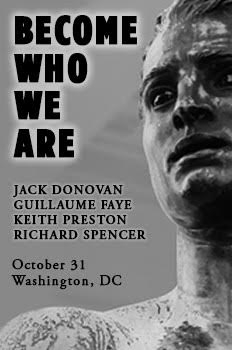Editor’s Note:
This is the transcript by V. S. of Richard Spencer’s Vanguard Podcast interview of Jonathan Bowden about Oswald Spengler. You can listen to the podcast here [2].
Richard Spencer: Hello, everyone, and welcome back to Vanguard! And welcome back as well, Jonathan Bowden! How are you, Jonathan?
Jonathan Bowden: Yes, hello! I’m very well. Thanks for having me on again.
RS: Quite good. Today we’re going to talk about the philosophy of Oswald Spengler. In these podcasts we’ve talked quite a bit about philosophers who are of interest to the New Right or the Alternative Right or White Nationalists or whatever you want to call us. And we’ve talked about Nietzsche in particular. Nietzsche is an interesting case in the sense that, despite the fact that he has quite a few unfashionable ideas from the standpoint of our enlightened modern age, nevertheless he is still quite popular. Libraries and bookstores are well-stocked with titles on Nietzsche.
Spengler, on the other hand, who equaled or surpassed Nietzsche’s popularity in Central Europe in his own time, has gone down the memory hole in a way. It’s hard to find a book by Spengler at your local bookstore, even a large one. Though I think people have heard about him or they have some general notion that he was a pessimistic German or something like this, they don’t really know a lot about the man and his philosophy. We hope we can increase the level of understanding, certainly, with this discussion today.
Jonathan, the way I wanted to start out this talk about Spengler and the philosophy of history is at a very basic level of understanding. I was thinking before we started this conversation that this idea of linear history is one that is really powerful for people and it also has something to do with Christianity in a way, but it’s also something that’s survived well into the post-Christian West. What I mean by linear history is what maybe could be described in just a simple phrase like “It keeps getting better all the time,” this notion that we’re the next step in history, and this history leads to greater freedom, greater liberation, greater understanding, greater technology, so on and so forth and that, yes, there might be some bad things that happen along the way but those are kind of speed bumps along this highway towards utopia or something like that.
I think if we look at the world from the standpoint of technology perhaps that is true. We’ve had the creation of medicines, from the automobile to the iPhone. Obviously, there’s a way that things have been getting better. They’ve been slowly perfected.
But, of course, culture and civilization, these are two very different things than technology.
Jonathan, maybe we can talk just a little about that just to get this conversation started and to get our listeners’ minds’ wheels turning, so to speak, about the philosophy of history. Think about that powerful assumption. Just that it seems like something that everyone in the modern West, maybe even the modern world, Left and Right, all have and that is of linear history and how Spengler is really challenging that. What do you think about that idea, Jonathan?
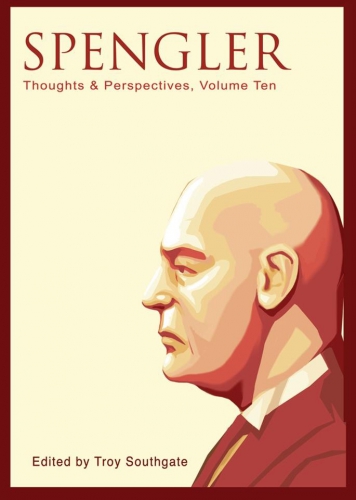 JB: Yes, I think that’s a good way in. Spengler is a cosmologist of history. He’s a botanist of history, in a way. He sees human cultures and their attendant civilizations very much like geological strata or the morphology of plant life in that they have a natural cycle, even a diurnal, seasonal one. They have a brief flowering and they have a spring, they have a summer, they have an autumnal phase, and then they have a winter of the soul, and then they die. They literally atrophy and die. His belief in the death of great cultures, that cultures could be seen to come to an end, or they can lie silent for enormously long periods prior to some renaissance or kickstart, is deeply troubling to the modern mind which is addicted to the idea of progress and progressivism whatever its standpoint.
JB: Yes, I think that’s a good way in. Spengler is a cosmologist of history. He’s a botanist of history, in a way. He sees human cultures and their attendant civilizations very much like geological strata or the morphology of plant life in that they have a natural cycle, even a diurnal, seasonal one. They have a brief flowering and they have a spring, they have a summer, they have an autumnal phase, and then they have a winter of the soul, and then they die. They literally atrophy and die. His belief in the death of great cultures, that cultures could be seen to come to an end, or they can lie silent for enormously long periods prior to some renaissance or kickstart, is deeply troubling to the modern mind which is addicted to the idea of progress and progressivism whatever its standpoint.
Spengler’s emotional register was profoundly melancholic and pessimistic. He once famously in Man and Technics said that “optimism is cowardice.” There is a degree to which his view of history, which is these radial circles which overlap with each other rather like a Venn diagram in mathematics, a science with which he was familiar, accords very much with his own view that things are cyclic and circular and turn back upon themselves, and cultures go through various stages which are inevitable, and each stage follows from the other one and has the seeds of death in its own mouth in the sense that the thing will turn full circle on itself. He turned cultural decline away from merely being of archival and archeological interest.
These are forbidding and almost totalitarian insights of pessimism which don’t accord easily with the 20th century. If you look at a book like Niall Ferguson’s The War of the World, for example, which is a narrative of the extreme violence in Western and global society in the century of the masses, the 20th century, that’s a mordant book. It’s an apocalyptic book. It’s a book that in some ways is opposed to the idea that things are getting better and better. Yet at the same time, it doesn’t feel emotionally pessimistic despite the fact that it’s brimming, on the whole, with pessimistic criteria. So, Ferguson remains an optimist in a sort of belletrist liberal methodology, the belief that things can get better even if they turn out for the worst at a particular time, which he wishes to express.
Spengler would have no truck with that. Spengler believes that cultures are sort of caged in a way and will wither and die a natural death just as [. . .] beauty in accordance with the rhythm which is close to that of biological life in human affairs.
RS: Before we get into his organic concept of history let’s talk a little bit about his milieu, where he was coming from. I would like to talk about the milieu of his life in Germany at the first quarter, first half of the 20th century.
But before that I think it’s worthwhile going back a little bit to the 19th century and some of the philosophies of history which preceded Spengler’s, and I’m thinking, of course, of Hegel and Kant — probably the two biggest figures in that philosophical school. Maybe you could just mention what are some of the ways that Hegel, probably the most well-known, influenced Spengler. Obviously Hegel had a dialectical view of history which is certainly more complicated than “it’s getting better all the time” linear view, but nevertheless it was a progress view of history. He actually felt that history was coming to an end with the Prussian state and so on and so forth.
So, what do you think about, say, the influence of some of these great German idealist thinkers that came before Spengler and how that impacted his notion of the decline of the West?
JB: Yes, I think that they obviously affected him deeply, because they looked for systematic answers unlike the neo-Kantian school that said there is no time for history and that all attempts to find a time in history are artistic and subjective and therefore historically worthless.
It’s important to realize that for a proportion of critics Spengler’s view is not just anathema, but it’s been fundamentally mysterious, because quite a few philosophical schools believe, whether it’s on the Left with Toynbee or it’s on the Right with Spengler, that it’s utterly pointless to have attempts at historical analysis which are non-linear and which seek for an answer to the conundrum of history, that seeks to elucidate the Sphinx and get it to answer questions about the nature of historical reality. They consider that there is no plan. There is nothing other than linear motion in the spasm of time and any attempt to find a historical plan other than the received wisdom of a work is fruitless. They would consider a work like The History of the Decline and Fall of the Roman Empire by Gibbon to be perfect in its way because it takes the Roman Empire as its topic where you have an enormous unfolding vista of historical time, and you have the idea that you have many triumphs and many disasters, but the end is partly a projection of the beginning. So, you have almost a biography of a society.
That’s acceptable. What isn’t acceptable from this school of thinking, which is the current one in academic orthodoxy at the present time, is to try to find a key or philosophical agency to history, to interpret history, that history has a meaning in the way that Thomas Carlyle believed it had meaning in the 19th century. Spengler’s addicted to finding the meaning in history, which pulls him to the outside of several of the major historical schools to begin with. There’s also the fact that he was self-taught and was a sort of autodidact and a sort of terribly gifted dilettante, as someone not completely kindly once said. History is an area par excellence which only academics really believe they are entitled to write.
So, in two areas, academicism and the search for an ontology in history — the search for teleology, the belief that there is a prospective future which can be determined, as Marx believed in a different way, and mapped out — those lie outside of Spengler’s purview and yet make marginal his historical essay, his attempt at finding out the meaning of things in his two volume enormous work The Decline of the West published in 1918 and 1923.
So, he draws on the primary idealists like Hegel, but I don’t think there’s much comparison to be frank when you get to the work, because Hegel believes that history will reach its fulcrum and its termination in the idealistic presentation of the Prussian state in history — a sort of being in history — whereas for Spengler the Prussian state, although he wanted Germany and the Germany of his time to dominate Europe, was just a part of the West and a part of the cycle of the West that would be doomed to decline as all of the great civilizations — the Arab, the Eastern Chinese, the Medieval — were doomed to decline in their way.
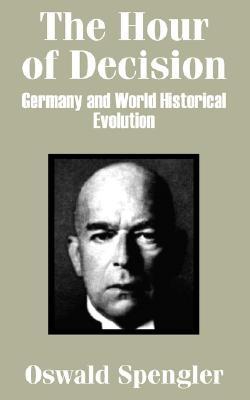 RS: Before we talk a little bit more about Germany in his time, actually, I think it would be good to lay out some of the basic terms of Spengler’s history. He talked about a series of great or high cultures and these included the Magian culture, which I guess is the Semitic culture, and the Apollonian of Classical culture, and then Western-American culture, which he described as quintessentially Faustian in nature.
RS: Before we talk a little bit more about Germany in his time, actually, I think it would be good to lay out some of the basic terms of Spengler’s history. He talked about a series of great or high cultures and these included the Magian culture, which I guess is the Semitic culture, and the Apollonian of Classical culture, and then Western-American culture, which he described as quintessentially Faustian in nature.
So, Jonathan, maybe you could elucidate some of these big ideas for our listeners so they could have an idea of his organic historical sense, just in particular with those three massive cultures. And again, we’re not talking about epochs, because he’s getting away from a sense of time and he’s putting it in terms of a culture and a people, a civilization. So, maybe you could explain those basic concepts and then also just delineate for our listeners what he means by the Magian, Apollonian, and then finally the Faustian culture, which he felt was coming to a close.
JB: Yes. He felt cultures were self-enclosed and were organic and were not time-concentric. He thought they have a period or expanse of time associated with them.
He sees the Middle Eastern culture as essentially magical and somewhat sterile and introverted and flat and a culture of the desert.
He sees Greek culture as proportioned and massive in its architectural and classical relief. He sees it as less dynamic than the Western culture, more staid, more fixed, and had a tendency towards a preternatural order and the specificity of same.
The Western culture, which he is most keen on, he sees as a partly diabolical culture. He sees it as Faustian. He sees it as a mismatch and matching of things that don’t coherently go together in other cultures. He sees it as a culture of advanced restlessness and absence of an inner sense of ease and with an extraordinary desire for self-transcendence, which is a desire to change everything again and again and again to make it new and make it work and make the Western culture the most dynamically aggressive culture on Earth.
RS: So, is he talking about a mindset with this — I hesitate to use this term but — a collective consciousness, so to speak, amongst the people that is expressed most fully in some of the great people of the civilization? Is that a good way to describe what he’s talking about?
JB: Yes, it’s a sort of civilizational construct of culture permeated through an elite as articulated through and by the masses within a particular civics over time. It’s racially-based to an extent, but only partly so, because his positions are sublimated racialisms whereby, although the Semitic mostly goes with the Magian and the Eastern Mediterranean largely goes with the Apollonian, and the Western is made up of most of Europe and ex-Europe in the New World and the far reaches of the world associated with Western imperial conquests and settlements, North America in particular, the notion that they are purely racial is not one that he accedes to.
He has a Nietzschean concept of race which is that race is important, because breeding is the basis of everything, but it’s too rudimentary for reasons of analysis. For analysis, you have to look at the culture and the civics which are created by specific races and intermingled variants of races over time, and pure biology is not enough to describe man’s ascent, if indeed it has been an ascent rather than a withering to death of prior acknowledged cultures of whatever beauty.
So, Spengler’s always an unhappy bedfellow for various people, because he never fits in with people’s preconditions and prior suppositions. There will always be a tension even with the racialist Right with Spengler as there is with the Left over his pessimistic and non-materialist views of history, his intuitionism, his opening to the subjective elements in culture, his belief in the wintering of the soul of a culture and its partial decline over time, his obsession with the coming up to decadence. All of these would not render him attractive to a Left-wing mind at all. But, at the same time, the liberal progressive sees little in him, the man of the center, because he’s too morbid, too mordant, and pessimistic, too professorial, and too linked to a prior theory which cuts against their ingrained optimism, including the idea, as you said at the beginning of this clip, that “things are getting better and better.”
RS: Jonathan, why don’t you tell us a little bit about this organic story of Western or Faustian culture and its origins after the collapse of the Roman Empire and then how he felt that it was declining and ending in his own lifetime? Maybe you could just give us some outlines of Faustian culture’s birth and flowering and then decline. What was he talking about? Obviously, in order to talk about these things you have to paint in really broad strokes, but I think that’s good, particularly with a podcast like this. So, give our listeners a sense of this organic story of Faustian culture.
JB: With the collapse of the Roman Empire I think he thinks that the classical world comes to an end and the medieval world as such begins. The medieval world is a static and closed civilization which is a magical one based upon totem and taboo and based upon a stiff and regulated cosmology that is only unsettled by the return of classical wisdom in what becomes the proto-Renaissance and then the Renaissance.
The Renaissance inflamed the entire civilization mentally and culturally and sends an enormous coursing torrent of energy through it which leads to an unmapping and an unfolding of new visions and new vistas. Whereby, we see the Middle Ages replaced by a post-Medieval Europe that looks back on the classical period but based upon the stolidity and solidity and the transcendental Magianship of the Middle Ages. It’s the Renaissance and the scientific methodology that gives rise to it, which is a return to a particular intellectual inheritance of the Greeks that gives man this diabolical pact element in the Western cosmos. This is the idea that Faust literally would sell his soul to Mephistopheles for knowledge. He would sell his soul for power over given things, for the power of magic almost in the interpretation of physical reality and the ability to hold sway over the physical world with which the sciences are concerned.
Western man begins a transmutation of everything in life, of every science, of every art, of all forms of economic dealing, all forms of culture and civilizational intent. Recalibrated and cast anew through this prism of Faustian fire, and this enables the West to set out as the Athenians had once done in a restricted Grecian compass to conquer much of the known world and to subdue it to their own restless tasking and desire for self-overbecoming at every possible instance. So, the West is seen as in some ways as a culture of the superman, in Nietzschean terms, reaching out across the world, reshaping other cultures and interacting with them in often destructively creative ways to release more energy, to enhance more transcendence, to enhance more creativity, to lead to more Faustian pacts and bargains, and then to become even more enraptured of its own colossal strength and vigor by importing even more energy through even greater and deeper and more resonating Faustian pacts until the thing teeters on the brink of absurdity to a degree, because the West becomes so enamored of its own mettle that it can’t see that it’s beginning, like all cultures, to engage upon ineffable decline.
RS: What creates the decline? What leads to decadence? What turns continual self-overcoming into decadence?
JB: Probably repetition and probably the fact that he believes that everything is pre-programmed like a computer chip to decay over time. You can only go to the well so often. Probably the spread of democratic, liberal humanist, and materialist ideas and the disjunction between the Enlightenment and the Renaissance.
The Renaissance is seen by most Enlightenment thinkers as a precursor of the Enlightenment, but he doubtless sees the Enlightenment as a giving way of the Faustian bargain to decadence to untrammeled ideas about the will of the majority which the people who put them forward, he believes, must know are absurd because the majority of men could never decide any question of any importance amongst themselves. That women would be given the vote and would be allowed into the function hall of the male. The liberal humanism that would increasingly refuse to distinguish between patterns of being and hierarchies in nature as they express themselves in society.
So, really, it’s the Enlightenment and its definition of the West, which is necessary, because in my reading of his codex of history the decline is necessary and therefore is inborn and the forces which are there, rather like illness and death in the individual, are there to permit change in the rule in the future and the ending of a cycle which is natural as it is in the biological world. So, he doesn’t see decadence as a disaster. He sees it as a necessity.
RS: So, are we still living in an enlightened age in a way that that was the turning point, and we’re kind of the last dregs of the Enlightenment?
JB: You could interpret it in that way, although at the end of The Decline of the West, of course, in the second volume, he preaches a new caesarism, that there may be a democratic caesarism, which of course came to be true throughout the latter third of the first quadrant of the 20th century.
His view that democratic niceties would be replaced by a much more Machiavellian and realistic politics, a politics of ruthless Realpolitik associated, even though he never advocated it, with Fascism. Although some of his political sayings are close to that of a fascistic or faschistoid conservative. That’s why, again, he falls between two camps. He’s not fascistic enough for those people who are enamored of those governments, movements, and regimes at a particular time, but nor is he conservative enough not to be associated with them at least through the glamor of nostalgia. So, he’s too quasi-fascistic for many conservatives, particularly now, but he’s also too conservative for thoroughgoing fascistic types. And that was his attitude, of course, to one of the most notorious governments in the Western world which he lived through the early stages of in the 1930s in his own country.

RS: Right. Actually, we talked about that and the Nazi regime banned his book, The Hour of Decision, which, again, I’m sure in the most of the modern mind they would probably just lump someone like Spengler on in there with Hitler as evil Right-wingers, but obviously that’s certainly not the way they saw it at the time.
Let’s put a little more pressure on this, because this is an interesting issue of Spengler’s life in an age which could even be described as “democratic caesarism.” That is, one based on populism, on popular sovereignty, but then one that is harsh and brutal in many ways, enamored with Realpolitik and so on and so forth. I think it’s a very interesting topic of Spengler’s own life.
JB: Yes, there’s always been a liberal qualm here as to why he didn’t support the Nazi regime. He did vote for Hitler against Hindenburg in the presidential election, which of course Hitler lost. Hindenburg retained the presidency until he died in office, and then it was after the Gleichschaltung it was just rolled up and it became one of Hitler’s many offices as he became supreme leader of all elements of the state and the offices of the president and chancellor were amalgamated into that of the Leader figure.
He also put a swastika outside his lodging windows to annoy the neighbors with his sister, saying that if he unfurled it one should always be prepared to pay the price for annoying people.
But, at the same time, he thought of them as irretrievably vulgar and without high culture, very much Ernst Jünger’s snobbish intellectual attitude towards them. He wasn’t so much bothered about the social origins of many of them, which is what convulsed the German old Right with which Spengler would have been more comfortable, but he was concerned about their cultural ignorance, as far as he was concerned, and the greatness and glory of what it was to be German seen in cultural terms.
In some ways, he’s too spare and too stark and too elitist a figure. For him, just to make mouthwatering speeches about Germany and German identity entirely begins it, what you mean by Germany, what you mean by German cultural identity, unless you’re highly educated, civilized, and knowledgeable about what it means to be German, or to be European in extenso, these political remarks are slightly meaningless.
His one intervention into politics, when he was attempting to get the power for a German on Ludendorff’s general staff during the First World War, General von Schacht I think, didn’t really go anywhere, because his view of practical politics as a man of the study was rather probably overly conspiratorial and sort of overly rarefied. Like a lot of academic intellectuals, he wouldn’t make a good politician.
But, at the same time, although he despised the Weimar Republic and regarded it as an unnecessary appendage, he looked at the glory of the German Empire which had preceded it. He was actually not particularly enamored of the Germans, partly because he believed they were too hostile to other European peoples, and he believed that the coming battles were civilizational and there should be alliances with other European nation-states against the hordes of Asia and Africa and the Far East who would be the real enemies in the future.
RS: So, he had an almost Nietzschean “Good European” sense or one that was almost similar to maybe even Lothrop Stoddard and some of the other people in that general time period.
JB: That’s right. To a Leftist’s mind, he’s almost as Right-wing as Hitler, but he doesn’t agree with his views, just as there are an enormous number of Left-wing intellectuals who, of course, didn’t agree with Stalin. So, there’s a degree to which he also didn’t entirely agree with the aggressive technological features in the Third Reich, which was Romantic and realist and agrarian at one level and yet embraced motorways and rockets and high technology at another, because he believed that technology had become a part of the enslavement of modern man. Very much prefiguring Heidegger’s thinking in this regard.
Also, of course, he didn’t share the anti-Semitism either, particularly. While in no sense being philo-Semitic, like Nietzsche, he didn’t share the crude Jew-baiting, beer hall attitudes that swirled around the German Right. It’s not civilizationally part of the way he perceived reality, because he didn’t view the world conspiratorially or metaphysically conspiratorially. He viewed the world in terms of these great overarching abstractions of cultural civilizations of which Germany was only a part.
He also was a pessimist and didn’t share the extreme and rather myopic optimism of that regime that was very shrill, particularly on its own behalf.
 RS: So, Jonathan, what kind of ideas did Spengler have for the future and did he see the rise of a new civilization?
RS: So, Jonathan, what kind of ideas did Spengler have for the future and did he see the rise of a new civilization?
This past weekend I attended the American Renaissance conference, and Dr. Richard Lynn was there and he gave a very enjoyable and informative talk about eugenics, actually, but he ended by talking about the world of the 21st and probably 22nd, maybe 23rd century being that of the East and China in particular.
Did Spengler talk about any of this? Or did he believe that a new civilization would arise, that an Oriental civilization might have a new rebirth? Did he talk about this? Maybe you could even speculate on it yourself.
JB: Yes, he didn’t really speak of it. He sounded the death knell of an ever present West that was exhausted at the end of the Great War. His thesis was misunderstood and tens of thousands of copies that made him from a sort of penniless, living in genteel poverty intellectual into a sort of major cultural figure throughout Germany and the West, was based on a misnomer.
The mass of the cultured people, of course we’re talking in terms of hundreds of thousands and not the millions, who bought his enormous book and some of the others, which made him moderately wealthy as a consequence and able to live independently, they interpreted the book as an explanation for Germany’s defeat in the First World War, and because it put it into world-historical and cosmological terms it exonerated Germany from its personal defeat. It also seemed scholarly and well-wrought and was not propagandistic. It was not the “stab in the back” mythology. It was not the fact that they’d been let down by forces at home, nor was it the normative liberal view that they’d just run out of men, run out of material, run out of resources and been defeated in that way.
So, people stuck to his book really on the misnomer, because what he was saying was that Germany’s defeat was part of a pattern of defeats that were going on within the civilization at a particular time.
He posited the idea that these defeats could be arrested for a time by democratic caesarism and various forms of populism for which he had a distaste actually, but which he believed to be necessary at this time in the cycle. In Man and Technics, for example, there’s a quite ruthless extolling of the virtues of some of these sorts of regimes up to a point. But he never thought that they were the be all and end all for culture. So, his belief was that the West would continue to decline throughout the 20th century. One of Spengler’s offshoots, of course, is the doctrine of the “clash of civilizations,” which was made famous by that book, The Clash of Civilizations.
RS: Right. By Samuel Huntington.
JB: Yes, written about what? Fifteen years ago now?
RS: Or so, yeah.
JB: Now, that’s a Spenglerian thesis, which he may not like to admit to be influenced by Spengler, some people don’t choose to. You have all sorts of people like the Beats on the Left, or metacultural Left — let’s put it that way — like Burroughs and Ginsberg and Kerouac, who openly admitted being strongly influenced by Spengler, but other people are very reluctant to even admit the fact that he’s come anywhere hear them and their thinking at all.
Nevertheless, the idea that other civilizations will rise, particularly in the Far East, and will challenge the West’s hegemony later in the last century — don’t forget he died in 1936 — is indisputable from the nature of his work, but he doesn’t go on to specify it very much. The second volume of The Decline of the West basically closes on the turnaround of democratic caesarism and the fact that the West is, nevertheless, going into an autumnal and wintry stage and leaves it at that.
But lots of people, of course, take up the mantle. Yockey’s views are strongly Spenglerian even though he fills in Spengler’s work by essentially giving it a National Socialist register. In some ways, Yockey is a Nazified Spengler, because Spengler was never a whole-hogger as far as they were concerned and actually had a different viewpoint. That’s why Yockey’s book tends to be two books in one. Eighty percent of it is a Spenglerian exercise and then at the end there’s the 20% where he basically adopts a Fourth Reich/Third Reich viewpoint, which is his own grafting onto the Spenglerian architecture of a sort of neo-National Socialist Proclamation of London opinion or editorial.
RS: One question that was coming to my mind was we are witnessing, experiencing the winter of Faustian Western culture. Do you think that if there were a rebirth amongst European peoples that it would be something different than Faustian culture? Would it be a kind of revival of the West as we’ve known it, or would there actually be a different paradigm that would be adopted by European peoples?
JB: Well, that’s very broad. I, personally, think that if there is to be a revival it would probably have to be more Classical than anything else and has to be a sort of classicism and has to be a return to the verities of the Greco-Roman world as at least a cultural basis and a starting point for thinking, because that provides you with a pre-Christian as well as a post-Christian dynamic. It’s rational. All of Western high culture had the Hellenic stamp upon it filtered through Rome and the Holy Roman Empire, Christianized and Germanicized, that came after it. And in some ways it’s a common appeal to the inner tensions in Western man that can be resolved classically. So, that’s the inner reason for GRECE, de Benoist’s outfit, calling itself the Group for Research and Study of European Civilization and culture. They want to go back to Greece with modern technology and with the hallmark of a new West and they want a new Right rather than an old Right to carry that project forward even though there are at least five currents of the New Right now separated even from de Benoist.
RS: Right. That’s certainly true. Well, Jonathan, this has been a fascinating discussion and I’m just going to put a bookmark in it because I think we could return to Spengler later on. As with so many of our podcasts, we only scratch the surface on these ideas and — I’m sure I speak for a lot of the listeners — I’m waiting for more. So, we should do it again. Thanks for being on the show again and speaking to us about Spengler, and we’ll talk to you soon.
JB: Thanks very much! All the best.Article printed from Counter-Currents Publishing: http://www.counter-currents.com
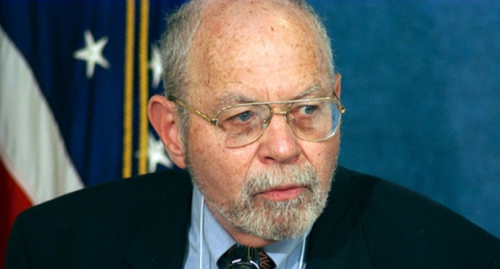
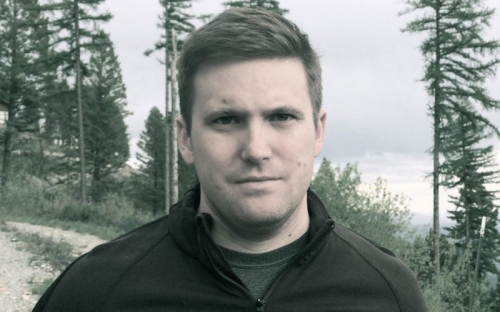



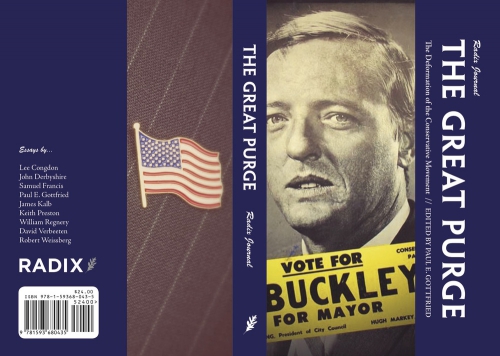

 del.icio.us
del.icio.us
 Digg
Digg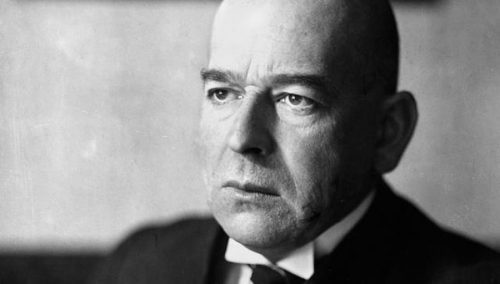
 JB: Yes, I think that’s a good way in. Spengler is a cosmologist of history. He’s a botanist of history, in a way. He sees human cultures and their attendant civilizations very much like geological strata or the morphology of plant life in that they have a natural cycle, even a diurnal, seasonal one. They have a brief flowering and they have a spring, they have a summer, they have an autumnal phase, and then they have a winter of the soul, and then they die. They literally atrophy and die. His belief in the death of great cultures, that cultures could be seen to come to an end, or they can lie silent for enormously long periods prior to some renaissance or kickstart, is deeply troubling to the modern mind which is addicted to the idea of progress and progressivism whatever its standpoint.
JB: Yes, I think that’s a good way in. Spengler is a cosmologist of history. He’s a botanist of history, in a way. He sees human cultures and their attendant civilizations very much like geological strata or the morphology of plant life in that they have a natural cycle, even a diurnal, seasonal one. They have a brief flowering and they have a spring, they have a summer, they have an autumnal phase, and then they have a winter of the soul, and then they die. They literally atrophy and die. His belief in the death of great cultures, that cultures could be seen to come to an end, or they can lie silent for enormously long periods prior to some renaissance or kickstart, is deeply troubling to the modern mind which is addicted to the idea of progress and progressivism whatever its standpoint. RS: Before we talk a little bit more about Germany in his time, actually, I think it would be good to lay out some of the basic terms of Spengler’s history. He talked about a series of great or high cultures and these included the Magian culture, which I guess is the Semitic culture, and the Apollonian of Classical culture, and then Western-American culture, which he described as quintessentially Faustian in nature.
RS: Before we talk a little bit more about Germany in his time, actually, I think it would be good to lay out some of the basic terms of Spengler’s history. He talked about a series of great or high cultures and these included the Magian culture, which I guess is the Semitic culture, and the Apollonian of Classical culture, and then Western-American culture, which he described as quintessentially Faustian in nature.
 RS: So, Jonathan, what kind of ideas did Spengler have for the future and did he see the rise of a new civilization?
RS: So, Jonathan, what kind of ideas did Spengler have for the future and did he see the rise of a new civilization?